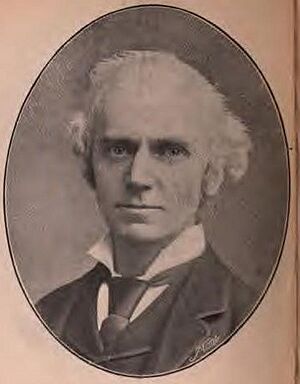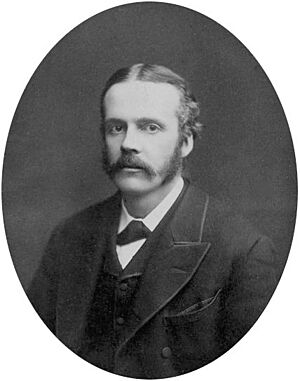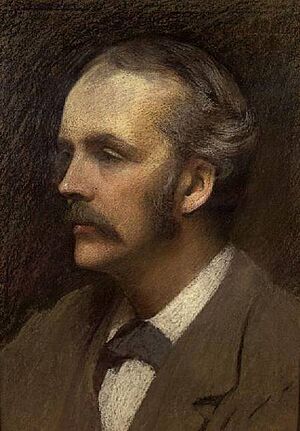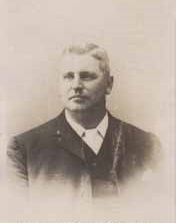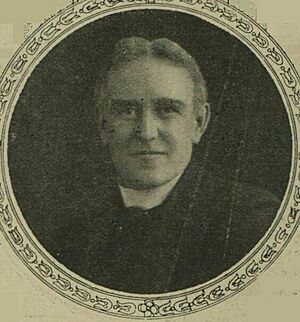Manchester East (UK Parliament constituency) facts for kids
Quick facts for kids {{{Name}}}[[{{{Type}}} constituency]] |
|
|---|---|
| [[Image:{{{Map1}}}Constituency.svg|120px|]] [[Image:England{{{Map2}}}.svg|120px|]] |
|
| {{{Name}}} shown within [[{{{Entity}}}]], and {{{Entity}}} shown within England | |
| Created: | {{{Year}}} |
| MP: | {{{MP}}} |
| Party: | {{{Party}}} |
| Type: | House of Commons |
| County: | [[{{{County}}}]] |
| EP constituency: | [[{{{EP}}} (European Parliament constituency)|{{{EP}}}]] |
Manchester East was a special area in the United Kingdom that elected one person to be a Member of Parliament (MP). An MP is someone who represents a local area in the UK Parliament, helping to make laws for the country.
This area, called a parliamentary constituency, was created in 1885. Before that, the larger city of Manchester was one big area. In 1885, Manchester was split into six smaller constituencies, and Manchester East was one of them. The others were Manchester South, Manchester North, Manchester North East, Manchester North West, and Manchester South West. All these areas stopped being constituencies in 1918.
Contents
What Were the Boundaries of Manchester East?
The Manchester East constituency was created by a law called the Redistribution of Seats Act 1885. This law decided exactly which parts of Manchester would be in the Manchester East area.
The areas included were:
- The Parish of Bradford
- The Parish of Ardwick
- The Parish of Beswick
- Part of the Parish of Chorlton-upon-Medlock, specifically the northern section.
Later, in 1918, another law changed the boundaries again. The Manchester East area was then split into two new constituencies: Manchester Ardwick and Manchester Clayton.
Who Were the Members of Parliament?
People elected to be MPs for Manchester East represented the area in Parliament. Here are the people who served as MPs for Manchester East:
| Election | Member | Party | |
|---|---|---|---|
| 1885 | Arthur Balfour | Conservative | |
| 1906 | Thomas Horridge | Liberal | |
| Jan. 1910 | John Edward Sutton | Labour | |
| 1918 | constituency abolished | ||
Election Results: How People Voted (1885-1918)
Elections are how people choose their MPs. A "general election" happens across the whole country. A "by-election" happens only in one area, usually if an MP leaves their job early.
Elections in the 1880s
| General election 1885: Manchester East | |||||
|---|---|---|---|---|---|
| Party | Candidate | Votes | % | ±% | |
| Conservative | Arthur Balfour | 4,536 | 55.0 | ||
| Liberal | Alfred Hopkinson | 3,712 | 45.0 | ||
| Majority | 824 | 10.0 | |||
| Turnout | 8,248 | 84.3 | |||
| Registered electors | 9,779 | ||||
| Conservative win (new seat) | |||||
| General election 1886: Manchester East | |||||
|---|---|---|---|---|---|
| Party | Candidate | Votes | % | ±% | |
| Conservative | Arthur Balfour | 4,160 | 54.2 | -0.8 | |
| Liberal | John Hattersley Crosfield | 3,516 | 45.8 | +0.8 | |
| Majority | 644 | 8.4 | -1.6 | ||
| Turnout | 7,676 | 78.5 | −5.8 | ||
| Registered electors | 9,779 | ||||
| Conservative hold | Swing | -0.8 | |||
After the 1886 election, Arthur Balfour was given an important job as Secretary of State for Scotland. When an MP gets a new government job, a by-election is sometimes needed.
| By-election, 11 Aug 1886: Manchester East | |||||
|---|---|---|---|---|---|
| Party | Candidate | Votes | % | ±% | |
| Conservative | Arthur Balfour | Unopposed | |||
| Conservative hold | |||||
Elections in the 1890s
| General election 1892: Manchester East | |||||
|---|---|---|---|---|---|
| Party | Candidate | Votes | % | ±% | |
| Conservative | Arthur Balfour | 5,147 | 52.0 | −2.2 | |
| Liberal | Joseph Edwin Crawford Munro | 4,749 | 48.0 | +2.2 | |
| Majority | 398 | 4.0 | −4.4 | ||
| Turnout | 9,896 | 86.7 | +8.2 | ||
| Registered electors | 11,418 | ||||
| Conservative hold | Swing | −2.2 | |||
Arthur Balfour was later appointed First Lord of the Treasury, another important government role. This also required a by-election.
| 1895 Manchester East by-election | |||||
|---|---|---|---|---|---|
| Party | Candidate | Votes | % | ±% | |
| Conservative | Arthur Balfour | Unopposed | |||
| Conservative hold | |||||
| General election 1895: Manchester East | |||||
|---|---|---|---|---|---|
| Party | Candidate | Votes | % | ±% | |
| Conservative | Arthur Balfour | 5,386 | 53.9 | +1.9 | |
| Liberal | Joseph Edwin Crawford Munro | 4,610 | 46.1 | −1.9 | |
| Majority | 776 | 7.8 | +3.8 | ||
| Turnout | 9,996 | 83.4 | −3.3 | ||
| Registered electors | 11,991 | ||||
| Conservative hold | Swing | +1.9 | |||
Elections in the 1900s
| General election 1900: Manchester East | |||||
|---|---|---|---|---|---|
| Party | Candidate | Votes | % | ±% | |
| Conservative | Arthur Balfour | 5,803 | 63.4 | +9.5 | |
| Liberal | Alfred Scott | 3,350 | 36.6 | −9.5 | |
| Majority | 2,453 | 26.8 | +19.0 | ||
| Turnout | 9,153 | 71.9 | −11.5 | ||
| Registered electors | 12,727 | ||||
| Conservative hold | Swing | +9.5 | |||
| General election 1906: Manchester East | |||||
|---|---|---|---|---|---|
| Party | Candidate | Votes | % | ±% | |
| Liberal | Thomas Horridge | 6,403 | 59.1 | +22.5 | |
| Conservative | Arthur Balfour | 4,423 | 40.9 | −22.5 | |
| Majority | 1,980 | 18.2 | N/A | ||
| Turnout | 10,826 | 85.1 | +13.2 | ||
| Registered electors | 12,724 | ||||
| Liberal gain from Conservative | Swing | +22.5 | |||
The 1906 election was very important. Arthur Balfour was the leader of the Conservative Party at the time. He lost his seat in Manchester East, which was unusual for a party leader.
Elections in the 1910s
| General election January 1910: Manchester East | |||||
|---|---|---|---|---|---|
| Party | Candidate | Votes | % | ±% | |
| Labour | John Sutton | 6,110 | 54.5 | New | |
| Conservative | Edward Elvy Robb | 5,091 | 45.5 | +4.6 | |
| Majority | 1,019 | 9.0 | N/A | ||
| Turnout | 11,201 | 88.6 | +3.5 | ||
| Labour gain from Liberal | Swing | ||||
| General election December 1910: Manchester East | |||||
|---|---|---|---|---|---|
| Party | Candidate | Votes | % | ±% | |
| Labour | John Sutton | 5,524 | 54.3 | -0.2 | |
| Conservative | Richard Gregory Proby | 4,653 | 45.7 | +0.2 | |
| Majority | 871 | 8.6 | -0.4 | ||
| Turnout | 10,177 | 80.5 | -6.1 | ||
| Labour hold | Swing | -0.2 | |||
A new General Election was planned for 1915, but it did not happen because of World War I. The candidates ready to stand were John Sutton for the Labour Party and Gerald Hurst for the Unionist Party.
Sources
- https://web.archive.org/web/20060520143104/http://www.manchester.gov.uk/elections/archive/gen1900.htm
- https://web.archive.org/web/20060520143047/http://www.manchester.gov.uk/elections/archive/gen1945.htm
- List of Privy Counsellors (1936–1952)
- http://politics.guardian.co.uk/electionspast/story/0,15867,1450577,00.html
- https://web.archive.org/web/20060211081205/http://www.aoqc42.dsl.pipex.com/majauto/autogra01.shtml
| Parliament of the United Kingdom (1801–present) | ||
|---|---|---|
| Vacant
since 1894
Title last held by
Midlothian |
Constituency represented by the prime minister 1902–1905 |
Succeeded by Stirling Burghs |
 | Kyle Baker |
 | Joseph Yoakum |
 | Laura Wheeler Waring |
 | Henry Ossawa Tanner |


